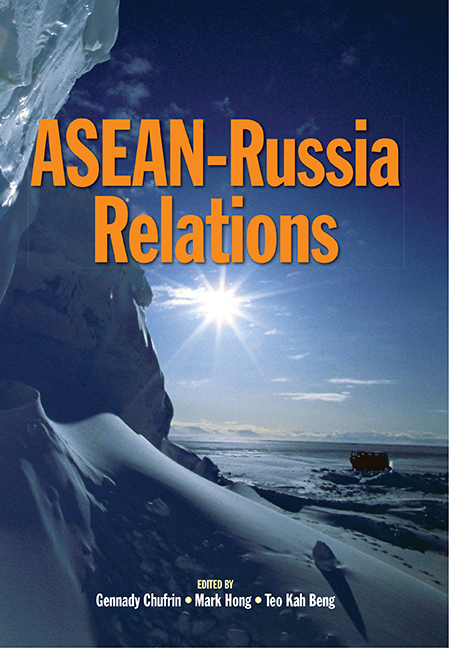Book contents
1 - ASEAN Engages Russia
from Part I - Overview of ASEAN-Russia Relations
Published online by Cambridge University Press: 09 November 2017
Summary
This chapter seeks to present the Association of Southeast Asian Nations’ perspectives on Russia — that is, the perspectives of ASEAN as a group — within the context of the relations between Russia and, again, ASEAN as a group. I will not deal with the perspectives on or the relations with Russia of individual ASEAN members, although those perspectives and relations help shape those of ASEAN as a group and the other way around.
ASEAN's relations with Russia are anchored on:
• The “dialogue” relationship;
• The ASEAN Regional Forum;
• The senior officials consultations;
• The Joint Cooperation Committee;
• Science and technology linkages; and, now,
• The ASEAN-Russia Summit Meeting scheduled in Kuala Lumpur in December 2005.
During the Cold War, the ASEAN countries recognized the Soviet Union as a superpower with global reach and significance. Accordingly, by 1976, most Southeast Asian countries had diplomatic relations with Moscow, after decades of hesitation and wariness. However, there persisted obstacles to closer relations with the USSR on the part of ASEAN as a whole and of its individual members. The Soviet Union's centrally planned economy constituted a barrier to a thriving economic relationship. The Cold War and geopolitical considerations engendered mutual suspicions. Vietnam's incursion into Cambodia, starting in late 1978, reinforced ASEAN's suspicions of Moscow, even as those suspicions influenced ASEAN's vehement opposition to Vietnam's move. After all, just before the incursion, Vietnam had joined COMECON and entered into what amounted to a mutual defence treaty with the USSR, whose communist ideology and perceived aggressive stance were regarded by ASEAN members as a threat.
In the late 1980s, several developments conspired to ease the way to improved ASEAN-Soviet relations. Mikhail Gorbachev's glasnost and perestroika were transforming the Soviet Union's domestic situation and foreign relations. Vietnam completed the withdrawal of its troops from Cambodia in 1989. Soviet support for Vietnam had perceptibly diminished. The peace process on Cambodia was gaining momentum, partly as a result of an apparent Sino- Soviet understanding. There was the larger improvement in Sino-Soviet relations. Finally, the Soviet Union broke up and the Cold War ended.
- Type
- Chapter
- Information
- ASEAN-Russia Relations , pp. 3 - 6Publisher: ISEAS–Yusof Ishak InstitutePrint publication year: 2006

